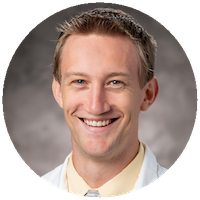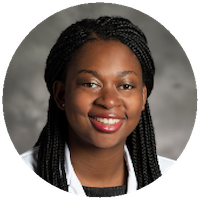Duke EM Resident Research Fellows Explore New Territory
Mitchell Veverka

My name is Mitchell Veverka and I’m a PGY-5 in the Department of Emergency Medicine. That was not a misprint. Yes, 5 years in an EM residency. And although at times it feels as though I was held back (working under an attending who was previously my junior), I made the correct choice in extending my training.
As an undergraduate I studied biochemical engineering and performed biomechanical research after graduation. During my research time I felt a lack of impact and wanted to help patients more directly and pursued medical school. While in medical school I felt tied by the current standard of practice and knew I wanted to continue to advance care through research. When deciding which specialty to choose, I saw emergency medicine as a specialty with diverse patient populations, rapid uptake of new technologies, and a fast pace, which made it the perfect fit to become a physician-scientist.
During residency interviews most were perplexed by my desire to pursue a paralleled research-clinical career. After Dr. Broder’s “we choose the moon” [1] speech, I was captivated. Duke and its staff not only accepted this aspiration but provided fodder to becoming a physician-scientist through an integrated research fellowship.
After finishing my first two clinical years I pursued the fellowship. I performed two years of basic science research in Dr. Junjie Yao’s Photoacoustic lab and obtained my Master’s of Science in Biomedical Engineering from Duke. During my ventures I developed two new pilot products to improve ED care. First a waiting room management software which has received IRB approval and we are starting enrollment soon and second a microvascular imaging device which has proved efficacious in pre-clinical tests and I’m currently applying for a second IRB approval.
After graduation I plan to continue my pursuit in applying engineering technologies to solving the complex medical issues we see in emergency medicine. Similar to Apollo, I could not have launched [2] my career without the resources or more importantly the people Duke Department of Emergency Medicine has provided me with.
[1] John F. Kennedy, Moon Speech
[2] Joshua Broder, Pun Educator
Lauren Coaxum

Since I was 5 years old, I knew that I wanted to be a physician. Since the journey began, the way that I have envisioned my career as a physician has slowly changed and has become more refined with time and experience. From my younger years being inspired by my pediatrician to my current path of training in emergency medicine residency and taking extra time out for a resident research fellowship, much has changed.
Growing up I thought that I would end up being a pediatrician. Medical school is when I discovered my interest in emergency medicine, little did I know residency would also open up a new path. During my second year of residency, I started to realize that my academic interests and passion for diversity, equity, and inclusion were leading me towards an interest in research.
I was given the opportunity to participate in Duke’s resident research fellowship, despite my limited prior experience. Over the past year, I have been working with Julian Hertz, MD as his mentee and a part of a team working on improving the use of evidence-based myocardial infarction care in northern Tanzania. This fits in well with my interest in cardiovascular health disparities.
Some highlights of the experience have been learning research methods through the Society for Academic Emergency Medicine’s Advanced Research Methodology Evaluation and Design course and having the opportunity to travel to Tanzania for a site visit funded by a Duke Global Health Institute grant.
As I look to the future, I hope to use my clinical and research training as an attending in an academic emergency medicine setting. I am confident that my training and experience here with Duke EM will allow me to serve my patients well.
